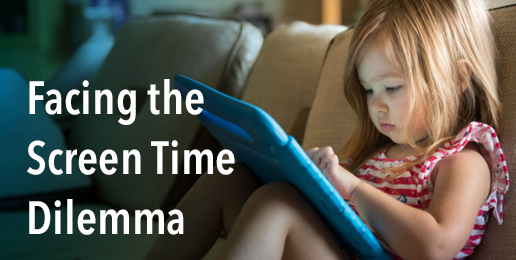
We are living in the iPad kid generation.
Generation Alpha (known “affectionately” as iPad kids) comprises kids born between 2010 and 2024. They have received the label “iPad kids” for that exact reason – screen time overload.
It seems as though anywhere you go – restaurants, parks, family functions – children are glued to their tablets, either watching videos or playing games.
Try to engage them in conversation? Forget it. The screen is more important.
Behavioral problems? Fixed. Give them the tablet to distract them.
According to the U.S. Census Bureau,
“In 2021, 57% of households without any children owned tablets. The share jumped to 75% in households with children only under the age of 5. In 2021, 81% of households with only older children — between the ages of 5 to 17 — owned tablets.”
With the rise of technological advancements, parents have become not only unaware of their children’s increased use of technology but also have normalized the increased use.
Yet, is there really any harm?
Yes, there most certainly is.
In a 2023 study, researchers found evidence showing the dangers of excess screen time.
For children with access to 4+ hours of screen time per day, associations were made between this excessive screen time and a developmental delay in problem-solving, motor, social, and communication skills.
Consider this: have you ever observed that children who have excessive screen time are less able to regulate their emotions? Many tend to be more short-tempered and struggle to obey simple instructions.
A University of Washington study found that 93% of parents reported behavioral struggles whenever they attempted to limit screen time.
“Parents reported varying degrees of pain when transitioning away from screens. Nearly all parents (93%) reported that their child throws a tantrum, whines, or resists ending screen time at least occasionally, while 37% reported that screen time almost always ends with a fight.”
Study upon study has shown the negative effects–mentally, socially, and physically–of excessive screen time on a child’s developing, sensitive brain.
So why do parents continue to indulge in screen time?
The same University of Washington study reported the following:
“Parents worry that their children’s exposure to screens is unhealthy and feel guilt that they, as parents, derive benefits from what they perceive to be an activity that can be detrimental to their children. Though parents perceive screen-free activities to be superior to screen-based ones, they permit their children to transition to screen experiences in order to keep them occupied when parents must tend to essential tasks.”
According to this study, parents admit they use screen time as a convenient way to keep their kids occupied.
Yet, those same parents admit that screen time is unhealthy for their children.
Conversely, the 2023 study referenced earlier found that educational types of screen time produced extremely good results (provided the screen use was not excessive).
“… a meta-analysis showed that greater screen use was associated with decreased language skills, whereas screen time spent on educational programs was associated with increased language skills… Because it is difficult to limit screen time in general in today’s world of electronic devices, it may be beneficial to identify and limit the screen time aspects that are associated with developmental delays while taking advantage of the educational aspects.”
I am sure many parents find themselves facing a dilemma concerning screen time use.
How do we fix the screen time problem and replace toxic screen time with healthy screen time?
Melanie Hempe found herself stuck at this crossroads when her oldest son, Adam, dropped out of college due to his video game addiction. When her family faced this crisis, Melanie decided to put her nursing degree to work and do something about it.
ScreenStrong was born.
“ScreenStrong empowers families to prevent screen problems and reclaim their kids from toxic screens—social media, video games, pornography.”
You might be wondering– how accurate is ScreenStrong’s information?
Parents will be delighted to know that ScreenStrong is based upon medically accurate, scientific research that will deliver on its promise to create strong kids and strong families.
“Our science-based solutions are not screen-free. Instead, we replace toxic screen use with healthy activities, life skill development, and family connections.
No more opinion-based answers, no more failed promises of parental controls. Rather, we support evidence-based, developmentally accurate medical research to guide you on your journey of preventing and addressing childhood screen dependency.”
In addition to this, ScreenStrong has been featured in Psychology Today, Thrive-Global, The Wall Street Journal, A&E Network, CBS, CNN, NPR, and more.
ScreenStrong will help your family navigate screen time in our tech-heavy age – your son who won’t stop gaming, your daughter who won’t get off her phone, etc. It is also affordable.
Get started with ScreenStrong today!























